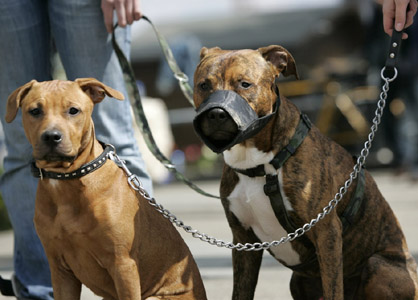
What pit bulls say about Swiss society

Geneva has followed cantons Valais and Fribourg and tightened regulations on owning dangerous dogs after several vicious attacks.
As calls for the government to pass a federal law on such dogs grow louder, two anthropologists give their views on the increasingly heated debate.
Jacqueline Milliet, a Swiss working at the French National Centre of Scientific Research, is not surprised by the debate, which many think has gone beyond the justifiable reaction caused by various recent incidents.
These include a toddler who was mauled and disfigured by a guard dog this month in Geneva or a six-year-old who was killed by a pit bull in Zurich in December.
“The relationship in the West between humans and animals has been centre stage again for quite some time,” she said. “The animals are a pretext to talk about ourselves and our behaviour in society.”
Jacques Hainard, head of the Neuchâtel Ethnography Museum, isn’t surprised either by the increase in tragedies involving dogs.
“Western societies have a regrettable habit of not putting animals in their right places,” he said.
Desire for power
Guard dogs have lived among humans for ages. “In towns there have always been fighting dogs and dog fights. It was in the 19th century, when societies started protecting animals, that people began opposing these fights,” said Milliet.
“This approach was in line with a desire to educate the so-called toiling masses, because dog fighting was very popular. It was exactly at this time that owning pets became democratised.”
But why did guard dogs then reappear in another era? “Keeping pets enables us to exist in a society where individualism is pushed to its limits,” Milliet said. “People who own dangerous dogs are basically saying: ‘this is my dog – and if I want an aggressive one, that’s my right’.”
She added that owning a pet shows a desire for power. “The owner controls the animal’s food, movements and sex life. In return, the animal makes its owner be noticed in the street. Even if all it does is create fear, a pit bull gives its owner a much stronger feeling of existing.”
Membership
Milliet also believes owning a pit bull grants membership of a group and of a class war. “It’s an external sign of aggression – like driving 4x4s.”
Milliet declined to create a detailed profile of a pit bull owner as she hasn’t studied this specific phenomenon, but she thinks that this external sign of power could be a symbolic counter to the well-off social classes that go around flaunting their 4x4s.
Last year the French media portrayed, time after time, pit bulls as a trait of youngsters from burnt-out suburbs.
Hainard is equally struck by the violence manifested by the ownership of dangerous dogs and by the virulence of the resulting debate.
“This subject reflects a fascinated revulsion with viciousness – or with the idea that people are worried by it,” he said.
“This theme is not new, but its reappearance is taking place in a society that is undergoing rapid change – a society in crisis which is once again discussing the natural and the cultural, the savage and the civilised.”
If all societal changes result in violence, Milliet concludes that “as one struggles to channel this violence, one attempts to domesticate it through pets”.
swissinfo, Frédéric Burnand in Geneva
Swiss legislation on dangerous dogs is less strict than in other European nations.
In Germany, it is illegal to import or breed some types of dogs.
In France, purchasing, selling, as well as importing and breeding dangerous dogs is illegal. People who owned one of these animals before the law became effective must put a muzzle on their dogs.
In Britain, a leash and a muzzle are compulsory for dogs that might be dangerous. Imports and the breeding of dogs such as pit bulls are illegal, as is the case in the Netherlands.
In June 2004, the federal authorities ordered that all dogs in Switzerland be tagged with a microchip or tattoo by the end of 2006.
Geneva, Valais and the two Basel cantons have tightened regulations on dog ownership over the past few years.
Dangerous dogs came under the spotlight after the death of a young boy bitten by pit bulls last December in canton Zurich.
According to a Federal Veterinary Office report dating from 2002, about 13,000 people are bitten by dogs annually in Switzerland.
In 24% of cases, the victim is bitten by his own dog, in 34% the dog is known to the person bitten, and in 42% of incidents the dog is unknown to the victim.
Before the young boy’s death in Oberglatt, the only fatality blamed on a dog dates back to November 2000 in Zurich.

In compliance with the JTI standards
More: SWI swissinfo.ch certified by the Journalism Trust Initiative






























You can find an overview of ongoing debates with our journalists here . Please join us!
If you want to start a conversation about a topic raised in this article or want to report factual errors, email us at english@swissinfo.ch.